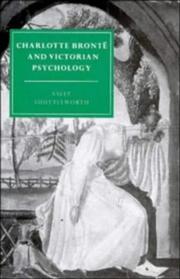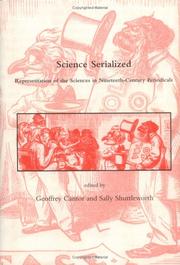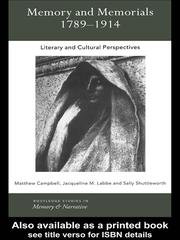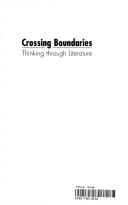| Listing 1 - 7 of 7 |
Sort by
|

ISBN: 9780511582226 9780521551496 9780521617178 0511582226 0585099219 9780585099217 0521551498 0511001010 9780511001017 0521617170 Year: 1996 Publisher: New York ; Cambridge Cambridge University Press
Abstract | Keywords | Export | Availability | Bookmark
 Loading...
Loading...Choose an application
- Reference Manager
- EndNote
- RefWorks (Direct export to RefWorks)
This innovative and critically acclaimed study successfully challenges the traditional view that Charlotte Brontë existed in a historical vacuum, by setting her work firmly within the context of Victorian psychological debate. Based on extensive local research, using texts ranging from local newspaper copy to the medical tomes in the Reverend Patrick Brontë's library, Sally Shuttleworth explores the interpenetration of economic, social, and psychological discourse in the early and mid-nineteenth century, and traces the ways in which Charlotte Brontë's texts operate in relation to this complex, often contradictory, discursive framework. Shuttleworth offers a detailed analysis of Brontë's fiction, informed by a new understanding of Victorian constructions of sexuality and insanity, and the operations of medical and psychological surveillance.
Psychological fiction, English --- Psychology in literature. --- Psychology as a theme in literature --- History and criticism. --- Brontë, Charlotte, --- Brontë, Charlotte --- Bolangte, Xialuodi, --- Bronte, Karlotta, --- Bronte, Sharlotta, --- Brontëová, Charlotte, --- Bŭrontʻe, Syarŭllotʻŭ, --- Douro, --- Pirāṇṭē, Cārlaṭṭi, --- Po-lang-tʻe, Hsia-lo-ti, --- Pŭrontʻe, Syarŭllotʻŭ, --- Tree, --- Бронте, Ш., --- Бронте, Шарлотта, --- Bellová, C., --- Bell, Currer, --- Wellesley, Charles Albert Florian, --- Gaskell, Elizabeth Cleghorn, --- Knowledge --- Psychology. --- Self in literature. --- Sex in literature. --- Brontë, Charlotte --- Psychology --- Great Britain --- History --- 19th century --- English fiction --- Psychological aspects --- Psychology in literature --- Self in literature --- Sex in literature --- Brontèe, Charlotte, - 1816-1855 - Knowledge - Psychology. --- Psychology - Great Britain - History - 19th century. --- English fiction - Psychological aspects. --- Arts and Humanities --- Literature --- Bronte, Charlotte,

ISBN: 0262269821 141756038X 0262262185 9780262269827 9781417560387 9780262262187 0262033186 9780262033183 Year: 2004 Publisher: Cambridge, Mass. : MIT Press,
Abstract | Keywords | Export | Availability | Bookmark
 Loading...
Loading...Choose an application
- Reference Manager
- EndNote
- RefWorks (Direct export to RefWorks)
Essays examining the ways in which the Victorian periodical press presented the scientific developments of the time to general and specialized audiences.Nineteenth-century Britain saw an explosion of periodical literature, with the publication of over 100,000 different magazines and newspapers for a growing market of eager readers. The Victorian periodical press became an important medium for the dissemination of scientific ideas. Every major scientific advance in the nineteenth century was trumpeted and analyzed in periodicals ranging from intellectual quarterlies such as the Edinburgh Review to popular weeklies like the Mirror of Literature, from religious periodicals such as the Evangelical Magazine to the atheistic Oracle of Reason. Scientific articles appeared side by side with the latest fiction or political reporting, while articles on nonscientific topics and serialized novels invoked scientific theories or used analogies drawn from science.The essays collected in Science Serialized examine the variety of ways in which the nineteenth-century periodical press represented science to both general and specialized readerships. They explore the role of scientific controversy in the press and the cultural politics of publication. Subject range from the presentation of botany in women's magazines to the highly public dispute between Darwin and Samuel Butler, and from discussions of the mind-body problem to those of energy physics. Contributorsinclude leading scholars in the fields of history of science and literature: Ann B. Shteir, Jonathan Topham, Frank A. J. L. James, Roger Smith, Graeme Gooday, Crosbie Smith, Ian Higginson, Gillian Beer, Bernard Lightman, Helen Small, Gowan Dawson, Jonathan Smith, James G. Paradis, and Harriet Ritvo
Science --- Science news --- Literature and science --- Sciences - General --- Physical Sciences & Mathematics --- History --- News, Science --- Popularization of science --- Natural science --- Science of science --- Sciences --- Popularization --- Communication in science --- Journalism --- Technical writing --- SCIENCE, TECHNOLOGY & SOCIETY/History of Science --- SOCIAL SCIENCES/Media Studies --- Natural sciences --- 050 <09> <41> --- 094:05 --- 655.411 --- 655.411 Wetenschappelijke uitgeverij --- Wetenschappelijke uitgeverij --- 050 <09> <41> Tijdschriften. Periodieken. Serials--(werken over)--Geschiedenis van ...--Verenigd Koninkrijk van Groot-Brittannië en Noord-Ierland --- Tijdschriften. Periodieken. Serials--(werken over)--Geschiedenis van ...--Verenigd Koninkrijk van Groot-Brittannië en Noord-Ierland --- Periodicals --- Oude en merkwaardige drukken. Kostbare en zeldzame boeken. Preciosa en rariora--Tijdschriften

ISBN: 1134583001 1280403780 0203466640 0203247272 9780203247273 9780203466643 9780415229760 0415229766 0203774884 9780203774885 9781134582952 9781134582990 9781134583003 9780415758314 0415758319 1134582994 Year: 2000 Volume: 5 Publisher: London New York Routledge
Abstract | Keywords | Export | Availability | Bookmark
 Loading...
Loading...Choose an application
- Reference Manager
- EndNote
- RefWorks (Direct export to RefWorks)
This volume explores the cultural importance of concepts and theories of memory. Ranging historically from the French Revolution to the beginnings of Modernism, it examines the importance of memory in cultural history.
English literature --- Literature and history --- Autobiographical memory in literature. --- Memory in literature. --- Memory as a theme in literature --- History and criticism. --- History --- Great Britain --- Civilization --- Autobiographical memory in literature --- Memory in literature --- Littérature anglaise --- Littérature et histoire --- Mémoire autobiographique dans la littérature --- Mémoire dans la littérature --- History and criticism --- Histoire et critique --- Histoire --- Grande-Bretagne --- Civilisation
Book
ISBN: 1526133687 9781526133687 1526147548 1526133709 Year: 2020 Publisher: Manchester, UK : Manchester University Press,
Abstract | Keywords | Export | Availability | Bookmark
 Loading...
Loading...Choose an application
- Reference Manager
- EndNote
- RefWorks (Direct export to RefWorks)
This collaborative volume explores changing perceptions of health and disease in the context of the burgeoning global modernities of the nineteenth century. With case studies from Britain, America, France, Germany, Finland, Bengal, China and the South Pacific, it demonstrates how popular and medical understandings of the mind and body were reframed by the social, cultural and political structures of 'modern life'. Essays within the collection examine ways in which cancer, suicide, and social degeneration were seen as products of the stresses and strains of 'new' ways of living. Others explore the legal, institutional, and intellectual changes that contributed to modern medical practice. The volume traces ways that physiological and psychological problems were being constituted in relation to each other, and to their social contexts, and offers new ways of contextualising the problems of modernity facing us in the twenty-first century. "Conditions such as stress, burnout, overwork and fatigue are central preoccupations of our era, but they have a longer history, that gives depth to contemporary debates. Similar problems were diagnosed in the nineteenth century, as popular and medical understandings of the mind and body were challenged and reframed by the politics and structures of 'modern life'. Engaging with current scholarship on the history of medicine, science, and technology, disability studies, childhood, and consumer culture, this collaborative volume explores how emotional and physical ailments of the nineteenth century were often understood as uniquely 'modern'. Sally Shuttleworth, Melissa Dickson, and Emilie Taylor-Brown gather work by leading international scholars to explore changing perceptions of health and disease in the context of the burgeoning global modernities of the nineteenth century. Case studies from Britain, America, France, Germany, Finland, Bengal, China, and the South Pacific, demonstrate that a multiplicity of medical practices were organised around new and evolving definitions of the modern self. Essays within the collection examine the ways in which cancer, suicide, and social degeneration were seen as products of the stresses and strains of 'new' ways of living. Others explore the legal, institutional, and intellectual changes that contributed to both positive and negative understandings of modern medical practice. Ultimately, the volume's integrative and holistic approach to notions of disease disrupts the frequent compartmentalisation of psychiatric, environmental, and literary histories in present practice to offer new ways of contextualising the problems of modernity facing us in the twenty-first century." -- Back cover.
Medicine. --- Social medicine --- Medicine --- History --- History of medicine --- Modern history to 20th century: c 1700 to c 1900 --- Social & cultural history --- history of medicine --- diseases of modern life --- global modernities --- medical modernity --- medicine and culture --- medicine and society --- pathologies of progress --- Public health --- Civilization, Modern --- Sociology --- History Of Medicine --- SOCIAL SCIENCE / General --- Nineteenth century --- Community health --- Health services --- Hygiene, Public --- Hygiene, Social --- Public health services --- Public hygiene --- Social hygiene --- Health --- Human services --- Biosecurity --- Health literacy --- Medicine, Preventive --- National health services --- Sanitation --- Health Workforce

ISBN: 1281295434 9786611295431 1847142508 9781847142504 9781841272320 9781847142504 1841272329 Year: 2001 Publisher: Sheffield, Eng. : Sheffield Academic Press,
Abstract | Keywords | Export | Availability | Bookmark
 Loading...
Loading...Choose an application
- Reference Manager
- EndNote
- RefWorks (Direct export to RefWorks)
This eclectic collection interrogates boundaries with reference to nineteenth and twentieth-century literature, performance, music and film from a diverse range of critical and theoretical perspectives. The authors probe the issue of negotiating boundaries in their innovative and imaginative investigations of science in Dickens, Eliot and Pater; narrative in Hawking and Weinberg; Bakhtin and the feminization of translation; lesbian romance by Jeanette Winterson; transitional females in migrant postcolonial fiction; pedagogy in South Africa; materiality and hypertext; the semiotic and money in
Literature --- Criticism. --- Criticism --- Evaluation of literature --- Literary criticism --- Rhetoric --- Aesthetics --- Appraisal of books --- Books --- Literary style --- History and criticism. --- Technique --- Evaluation --- Appraisal
Book
ISBN: 9780822945512 0822945517 9780822986607 0822986604 Year: 2019 Publisher: Pittsburgh, Pennsylvania : University of Pittsburgh Press,
Abstract | Keywords | Export | Availability | Bookmark
 Loading...
Loading...Choose an application
- Reference Manager
- EndNote
- RefWorks (Direct export to RefWorks)
Much like the Information Age of the twenty-first century, the Industrial Age was a period of great social changes brought about by rapid industrialization and urbanization, speed of travel, and global communications. The literature, medicine, science, and popular journalism of the nineteenth century attempted to diagnose problems of the mind and body that such drastic transformations were thought to generate: a range of conditions or "diseases of modernity" resulting from specific changes in the social and physical environment. The alarmist rhetoric of newspapers and popular periodicals, advertising various "neurotic remedies," in turn inspired a new class of physicians and quack medical practices devoted to the treatment and perpetuation of such conditions. Anxious Times examines perceptions of the pressures of modern life and their impact on bodily and mental health in nineteenth-century Britain. The authors explore anxieties stemming from the potentially harmful impact of new technologies, changing work and leisure practices, and evolving cultural pressures and expectations within rapidly changing external environments. Their work reveals how an earlier age confronted the challenges of seemingly unprecedented change, and diagnosed transformations in both the culture of the era and the life of the mind.
Medicine --- History of Medicine --- Health Knowledge, Attitudes, Practice --- History, 19th Century --- 19th Cent. History (Medicine) --- 19th Cent. History of Medicine --- 19th Cent. Medicine --- Historical Events, 19th Century --- History of Medicine, 19th Cent. --- History, Nineteenth Century --- Medical History, 19th Cent. --- Medicine, 19th Cent. --- 19th Century History --- 19th Cent. Histories (Medicine) --- 19th Century Histories --- Cent. Histories, 19th (Medicine) --- Cent. History, 19th (Medicine) --- Century Histories, 19th --- Century Histories, Nineteenth --- Century History, 19th --- Century History, Nineteenth --- Histories, 19th Cent. (Medicine) --- Histories, 19th Century --- Histories, Nineteenth Century --- History, 19th Cent. (Medicine) --- Nineteenth Century Histories --- Nineteenth Century History --- Knowledge, Attitudes, Practice --- Medicine, History --- History Medicines --- Medicine Histories --- Medicines, History --- Clinical sciences --- Medical profession --- Human biology --- Life sciences --- Medical sciences --- Pathology --- Physicians --- History --- history --- United Kingdom. --- Great Britain --- Isle of Man --- Health Workforce --- Medicine. --- SCIENCE --- General. --- 1800-1899. --- Great Britain. --- 1800-1899 --- Grossbritannien --- Vereinigtes Königreich von Großbritannien und Nordirland --- Großbritannien und Nordirland --- England --- UK --- Angleterre --- Brīṭāniyā al-ʿUẓmā --- Brīṭāniya 'l-ʿUẓmā --- Vereinigtes Königreich Großbritannien und Nordirland --- United Kingdom --- United Kingdom of Great Britain and Northern Ireland --- Grande Bretagne --- British Isles --- United Kingdom of Great Britain and Ireland --- Royaume-Uni --- Gran Bretagna --- U.K. --- GB --- Grande-Bretagne --- British Empire --- Britisches Reich --- Briten --- Schottland --- Commonwealth --- 1707 --- -Anglia --- Angliyah --- Briṭanyah --- England and Wales --- Förenade kungariket --- Grã-Bretanha --- Igirisu --- Iso-Britannia --- Marea Britanie --- Nagy-Britannia --- Prydain Fawr --- Saharātchaʻānāčhak --- Storbritannien --- Velikobritanii͡ --- Wielka Brytania --- Yhdistynyt kuningaskunta --- Northern Ireland --- Scotland --- Wales --- Großbritannien.

ISBN: 0191920371 1283296756 9786613296757 0191612561 9780191612565 9781283296755 9780199296989 0199296987 Year: 2010 Publisher: Oxford, UK Oxford University Press
Abstract | Keywords | Export | Availability | Bookmark
 Loading...
Loading...Choose an application
- Reference Manager
- EndNote
- RefWorks (Direct export to RefWorks)
When her family becomes impoverished after a disastrous financial speculation, Agnes Grey determines to find work as a governess to contribute to their meagre income. But Agnes's enthusiasm is swiftly extinguished as she struggles first with the children and then with the family.
Governesses --- England
| Listing 1 - 7 of 7 |
Sort by
|

 Search
Search Feedback
Feedback About UniCat
About UniCat  Help
Help News
News